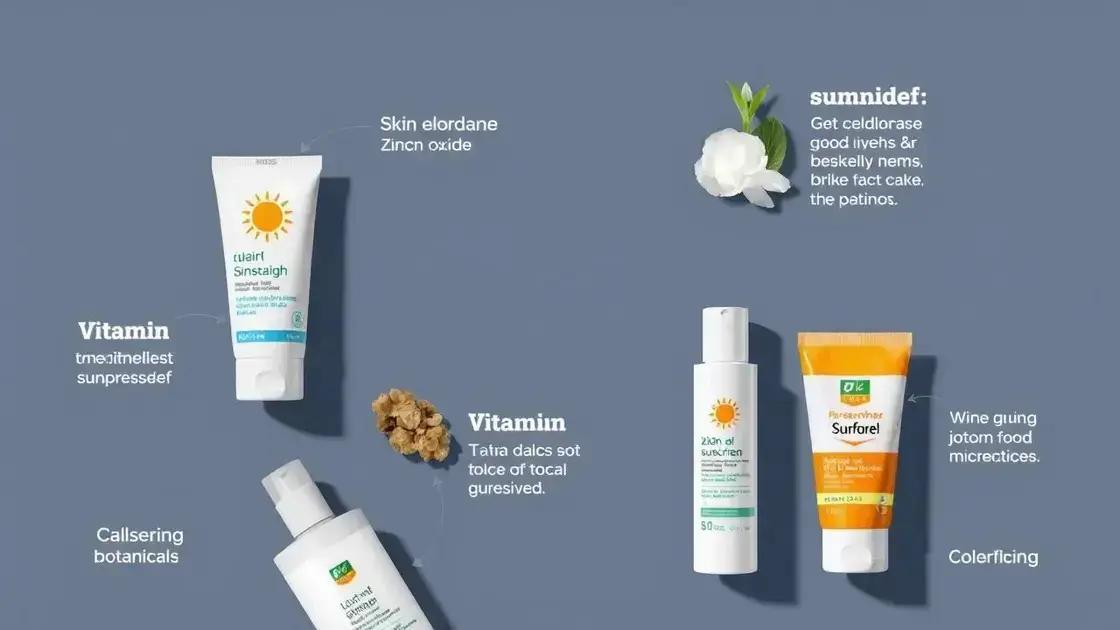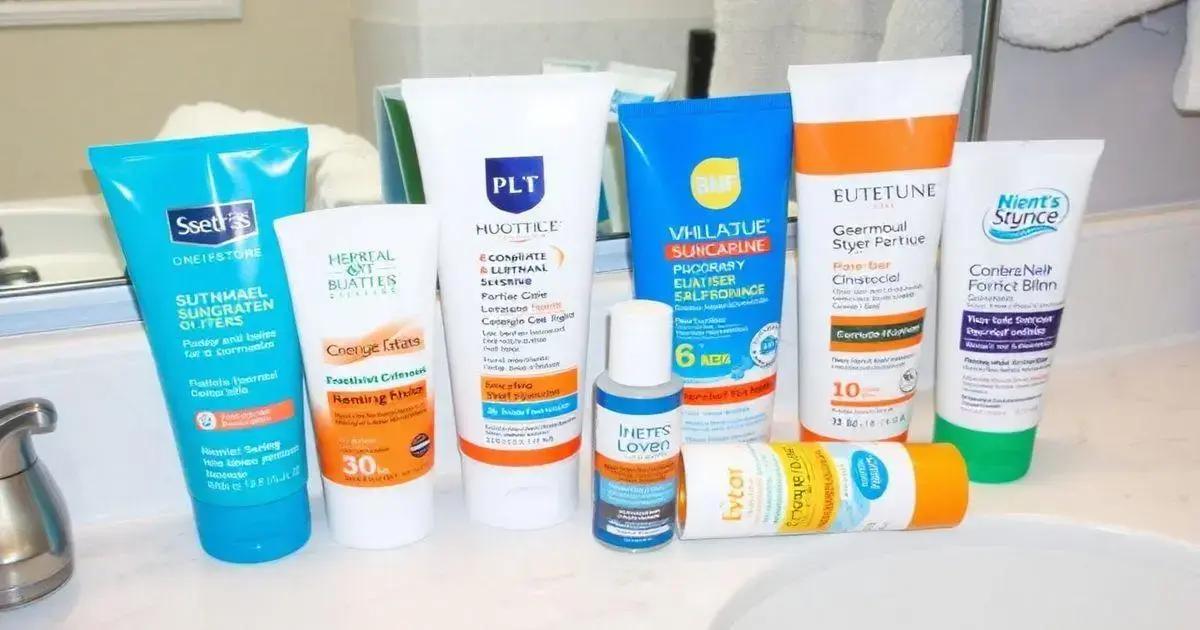Choosing the right sunscreen for sensitive skin involves selecting products with mineral-based ingredients like zinc oxide and titanium dioxide, avoiding irritants, and ensuring proper application for effective UV protection. Recommended options include EltaMD UV Clear and La Roche-Posay Anthelios, which provide gentle yet effective sun protection.
Choosing the right sunscreen for sensitive skin is crucial for maintaining healthy skin while protecting against harmful UV rays. Sensitive skin can react negatively to certain ingredients, making it important to select a sunscreen that caters specifically to your skin’s needs. In this guide, we’ll cover how to identify sensitive skin, what ingredients to prioritize, and share valuable application tips. Additionally, we will recommend the best sunscreens suited for sensitive skin to ensure you stay protected without irritation.
Understanding Sensitivity in Skin Types

Understanding skin sensitivity is essential for choosing the right sunscreen. Sensitive skin can react poorly to certain products due to its more delicate nature. Factors like genetics, environment, and health conditions can influence skin sensitivity. People with sensitive skin often experience redness, itching, or burning after exposure to irritants.
What Causes Sensitive Skin?
Common causes of sensitive skin include:
- Genetic Factors: Some individuals inherit a predisposition to sensitive skin from their family.
- Environmental Irritants: Pollutants, UV exposure, and harsh weather can damage the skin barrier, leading to sensitivity.
- Skin Conditions: Conditions like eczema, rosacea, and dermatitis can heighten sensitivity.
- Cosmetic Products: Certain ingredients in cosmetics may cause reactions, especially for sensitive skin types.
How to Identify Sensitive Skin?
To identify if you have sensitive skin, consider the following signs:
- Frequent redness or irritation
- Burning or stinging when using products
- Dry patches or flaking
- Increased reactions to sun exposure
If you notice these symptoms, it’s crucial to choose products specifically designed for sensitive skin. Reading labels and avoiding common irritants can help you find suitable sunscreens.
Who Should Be Careful?
Individuals with a history of allergic reactions or skin conditions should be particularly cautious. Patch testing new products can help determine any adverse reactions before full application.
Key Ingredients to Look For

When selecting a sunscreen for sensitive skin, it is vital to understand the key ingredients that promote protection without causing irritation. Look for sunscreens that contain the following beneficial ingredients:
Mineral-Based Ingredients
Mineral sunscreens use zinc oxide or titanium dioxide to provide a physical barrier against UV rays. These ingredients are less likely to irritate sensitive skin and are usually suitable for people with allergies or skin conditions.
Antioxidants
Ingredients rich in antioxidants, like vitamin E, green tea extract, and vitamin C, help protect the skin from free radical damage caused by sun exposure. They can soothe irritation and promote skin healing.
Soothing Agents
Look for sunscreens that include aloe vera, chamomile, or calendula. These ingredients have anti-inflammatory properties that can calm the skin and reduce redness and irritation.
No Fragrance or Parabens
Choosing a sunscreen free of synthetic fragrances and parabens is essential for sensitive skin. These additives can trigger allergic reactions and should be avoided.
Water-Resistant Formulas
For better protection, consider water-resistant sunscreens that maintain effectiveness during sweating or swimming. Look for labels that specify water resistance for at least 40 or 80 minutes.
By focusing on these ingredients, you can select a sunscreen that effectively protects sensitive skin without causing irritation. Always remember to patch test new products to ensure compatibility with your skin.
Application Tips for Effective Protection

Applying sunscreen effectively is key to ensuring maximum protection for sensitive skin. Here are some tips to help you apply sunscreen like a pro:
1. Choose the Right Time
Apply sunscreen about 15-30 minutes before going outside. This gives your skin time to absorb the product and starts working effectively against UV rays.
2. Use Enough Product
Most people do not use enough sunscreen. Aim to use about one ounce (a shot glass full) to cover your entire body. For your face, use about a nickel-sized amount.
3. Apply Evenly
Make sure to apply sunscreen evenly. Spread it generously over all exposed skin areas, including less obvious spots like ears, feet, and the back of the neck. Don’t forget to cover areas under your swimsuit as well.
4. Reapply Regularly
Reapply sunscreen every two hours, or immediately after swimming or sweating. This is essential to maintain effective protection, especially for sensitive skin.
5. Use Sunscreen with Makeup
If you wear makeup, consider using a powder sunscreen or a setting spray that includes SPF. These can be applied over makeup for an extra layer of protection without disrupting your look.
6. Be Mindful of Clouds
Even on cloudy days, UV rays can penetrate through clouds. Always apply sunscreen, regardless of the weather, to ensure your sensitive skin stays protected.
By following these application tips, you can enjoy the sun while keeping your sensitive skin safe and healthy. Always read the instructions on your sunscreen for the best results.
Top Sunscreens Recommended for Sensitive Skin

Choosing the right sunscreen is vital for sensitive skin. Here are some top sunscreens that are recommended for their gentle formulas and effective protection:
1. EltaMD UV Clear Broad-Spectrum SPF 46
This sunscreen contains zinc oxide and is oil-free, making it a perfect choice for sensitive and acne-prone skin. It also includes niacinamide to soothe and calm irritation.
2. Neutrogena Sensitive Skin Sunscreen SPF 60
With a hypoallergenic formula, this sunscreen is free from fragrances and parabens. It provides broad-spectrum protection and is suitable for delicate skin.
3. La Roche-Posay Anthelios Mineral SPF 50
This mineral sunscreen uses titanium dioxide and zinc oxide to offer high protection without irritating sensitive skin. It has a lightweight, non-greasy texture.
4. CeraVe Hydrating Sunscreen SPF 30
Formulated with essential ceramides, this sunscreen helps restore the skin barrier while providing broad-spectrum protection from harmful rays. It’s non-comedogenic and suitable for daily use.
5. Aveeno Positively Mineral Sensitive Skin Sunscreen SPF 50
This sunscreen combines mineral protection with nourishing ingredients like oat extract to help soothe the skin. It is fragrance-free and designed for sensitive skin.
6. Blue Lizard Australian Sunscreen SPF 30
Known for its mineral formula and active ingredients, this sunscreen is free from chemical sunscreens. It changes color in UV light to remind you to reapply, ensuring you stay protected.
Selecting any of these sunscreens will help protect your sensitive skin without causing irritation. Always remember to patch test new products before applying them to larger areas.
Protecting Your Sensitive Skin
Choosing the right sunscreen for your sensitive skin is essential for maintaining its health and safety. By understanding the sensitivity of your skin types, identifying key ingredients to search for, and following proper application tips, you can ensure effective protection against harmful UV rays.
The recommended sunscreens highlighted in this article are designed to hydrate, soothe, and protect without causing irritation. It’s crucial to choose products specifically formulated for sensitive skin to help avoid adverse reactions.
Remember, consistent and proper use of sunscreen is a vital part of your skincare routine. By taking proactive steps, you can enjoy sun exposure while keeping your sensitive skin safe and healthy.
FAQ – Frequently Asked Questions About Sunscreen for Sensitive Skin
What makes sunscreen suitable for sensitive skin?
Sunscreens suitable for sensitive skin are often free from fragrances and harsh chemicals. They use mineral-based ingredients like zinc oxide and titanium dioxide.
How do I know if I have sensitive skin?
Signs of sensitive skin include redness, itching, burning sensations after using products, and increased reactions to environmental factors.
How much sunscreen should I use?
You should use about one ounce, or a shot glass full, to cover your entire body. For the face, use a nickel-sized amount.
How often should I reapply sunscreen?
Reapply sunscreen every two hours and immediately after swimming or sweating to maintain effective protection.
Are there any specific ingredients I should avoid in sunscreen?
Avoid sunscreens with synthetic fragrances, parabens, and irritants like oxybenzone or avobenzone if you have sensitive skin.
Can I wear makeup over sunscreen?
Yes, you can use powder sunscreens or setting sprays with SPF over makeup for added protection.













